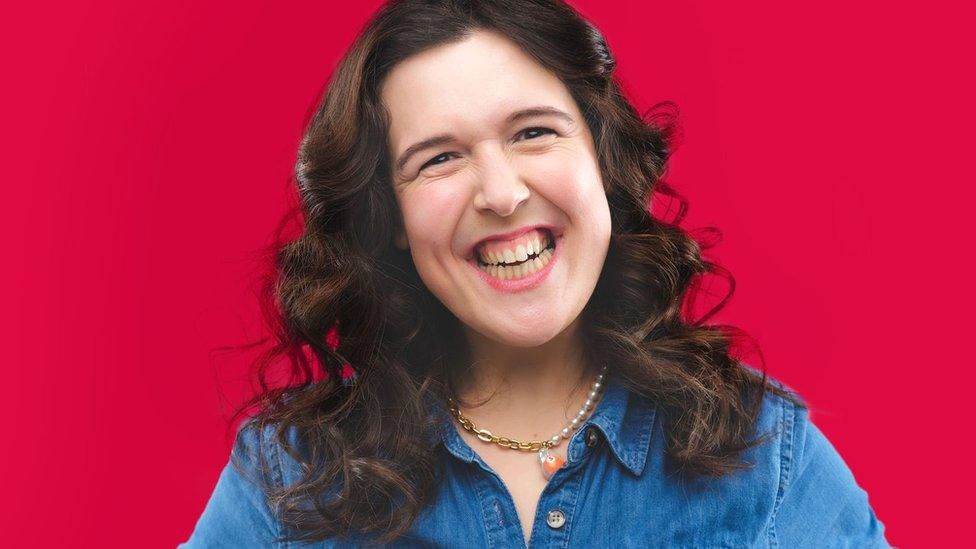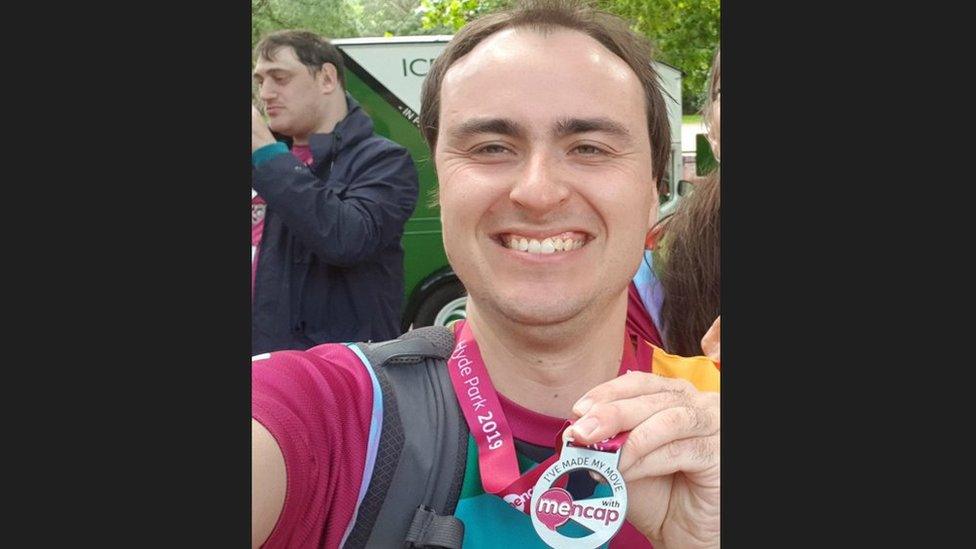Rosie Jones’s documentary and the R-word: 'We can't keep being poked like a bear'
- Published

Rosie Jones is a patron of the 2023 UK Kid's Comedy Festival
High profile comedian, Rosie Jones, has caused controversy after announcing her latest documentary, about online abuse, has been called, Am I A R*tard? [sic]. For many, the R-word is one of the most offensive slurs out there. It's left many people torn, between rooting for the Golden Girl who's smashed the glass ceiling for disabled people and reinforcing an outdated insult.
"It makes me feel angry," says Harry Roche, who has learning disabilities and works for the charity, Mencap. "It made me feel like I'm being discriminated [against]."
Rosie's Channel 4 documentary sees her as presenter and executive producer. In it she digs deep into her own experiences of online abuse as a disabled woman with cerebral palsy and that faced by others - it's confronting and has brought up lots of situations she would rather forget.
Earlier this year, she told the BBC's disability podcast, Access All, that the making of it had been traumatic.
"[It] has been quite hard for me because a lot of the things that I've shut away…I've had to confront and because of that I'm in therapy."
It suggests that the comedian wasn't just trying to be humorous or quirky, and this was a serious attempt to make a difference.
But for lots of disabled people, that isn't good enough.
In fact, three contributors who agreed to appear in the documentary, and were filmed talking about their experiences, pulled out once they learned of the title.
"I've already seen it so I know that it's a great documentary," says The Daily Mirror disability rights columnist, Rachel Charlton-Dailey, who herself is in therapy because of the regular abuse she receives as a disabled woman. "But this show, isn't just about Rosie."
She says: "I do believe that it was a really tough show for her to make, but what about the people who were making the show and also had to recount all of the things they experienced? And then when they raised their very legitimate concerns [about the title] were pushed from pillar to post and ultimately ignored.
"It could have been so easy as just changing the word, but they instead decided to get rid of so many important voices."

LISTEN: You can hear more about this hot-topic on the BBC Access All podcast.
And Paralympian Ellie Simmonds joins Emma Tracey to talk about her adoption experience and recently finding her birth mother.

The R-word originated in medical practice to describe children with intellectual disabilities, but over time it warped into an insult.
It crossed into popular culture, especially in America and the UK. The animated sitcom, South Park was one of those to regularly band it about, something Rachel remembers clearly as it was "huge" when she was growing up. It was later considered to have redeemed itself with the inclusion of disabled characters, Timmy and Jimmy.
But Rachel says she fears Rosie's use of the word will give a similar approval to its use.
"This is not about attacking Rosie. My worry is that the people who already use that word so freely are going to see this as a license to use it again."
As the debate around the documentary rumbled around social media, Rosie released an Instagram video explaining her stance.
"I get it, a lot of people will find this word very shocking and upsetting," she says. "But, in my opinion, society doesn't take this word and other ableist forms of language as seriously as any form of abuse from any other minority.
"So I said to Channel 4: 'Let's do it, let's tackle the problem head on and use that word in the title and then hopefully people will think twice about using the word and other ableist slurs ever again'."
TV presenter Mik Scarlet, appreciates where she's coming from, having got into similar hot water at the start of his career, but fears this could be a case of history repeating itself from a much darker time.
It took him straight back to several episodes of Blue Peter in 1981 which stayed in the memories of thousands of children, for all the wrong reasons.
During an update on the latest Bring and Buy sale to raise money for The Spastic Society (now called Scope), Joey Deacon, a man with cerebral palsy in his 50s was featured, to give some insight to the young viewers about peoples' different lives.
That short film inspired another slur, which became the "ultimate playground taunt," Mik says, and which was regularly thrown at him.
"The idea is, 'let's do something good', but I'm unsure that's the right route. I think Rosie's programme will end up being devalued by its title. So the R-word might start popping up more than we are hoping."
Some have argued that Rosie is simply reclaiming an insult - taking the stigma out of the word and using it with pride.
But many have been quick to call out that, as a woman with cerebral palsy, a word related to intellectual disabilities isn't one for her to reclaim.

Harry thinks the R-word should just 'fade away'
The learning disability charity, Mencap, released a punchy statement as soon as it learned of the title.
Jackie O'Sullivan, Mencap's Director of Communications, Advocacy and Activism, says: "People have told us that they are shocked and upset by the title of this documentary.
"If offensive words are to be eliminated in the narrative around disability, they must be taken out of circulation entirely. They should be regarded as truly unspeakable.
"We have contacted Channel 4 to ask them about their editorial decisions."
The BBC also contacted Channel 4 and a spokesman said: "The film makes very clear it is an unacceptable and offensive ableist term and its inclusion was carefully considered in conversations with the editorial team, Rosie and a disability consultant
"We have removed three contributors from the documentary at their request and fully respect their decision."
Harry has been left frustrated by the situation. He loves history, especially reading about the Tudors, and says many words he has spotted in history books have since dropped out of use, so: "Why can't the R-word fade away?"
"This word is very old school and it's time to abolish the R-word out of the English dictionary."
He says one way of stopping similar situations arising again, is by insuring disabled people are involved in media at all levels.
"We need people with a learning disability representing all areas of the media. Doesn't matter whether you're on screen, off screen. That could make the world a better place," he says.
Mik agrees and hopes this flare-up will become a "watershed moment where we say 'this is it'.
"We can't keep being poked like a bear," he says. "We need disabled people to be more involved in all areas of production, so that means not just the presenter that gets it in the neck. We need to be shaping television for the future."
Rosie's documentary is due to be released on 20 July and Mik plans to tune in.
"I just think it's really sad and I think it's a missed opportunity because I bet the programme is going to be amazing."
You can listen to the podcast and find information and support on the Access All page.
